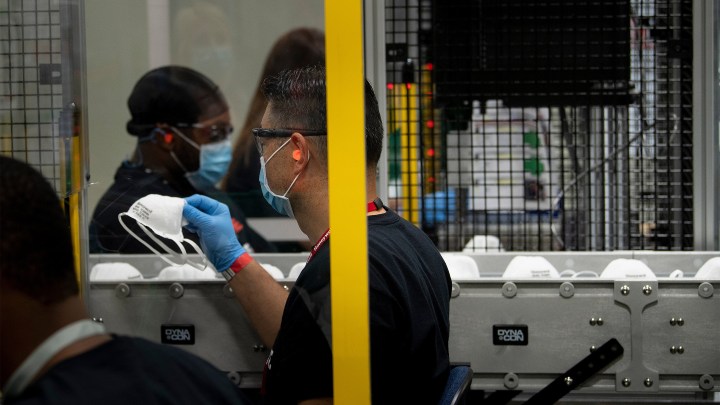
Companies scramble to protect their supply chains
Companies scramble to protect their supply chains

Ford, we learned last week, is paying some of its suppliers early to keep them alive through the pandemic. The idea is to reopen and have all the parts you need still there.
A lot of companies are thinking about this — not just how they can stay alive, but how and whether all the suppliers and links in their chain can too, and how they can protect those supply chains.
At the beginning of the pandemic, some companies started hoarding electrical equipment the same way they were stocking up on toilet paper. Luke Durcan handles North America strategy for Schneider Electric, which makes all kinds of electrical equipment.
“People were panic buying,” Durcan said. “People were stocking up on electrical infrastructure.”
That’s a problem for a business because it sends a shock wave through the supply chain — you have to ramp up, and so do your suppliers.
“If a supplier says, yeah, yeah, yeah, we can take your order, knowing full well they can’t fulfill it, you’re done,” Durcan said.
You might think that in 2020, a business would know if its suppliers’ suppliers were running low, or its customers’ customers were clamoring for more, but a lot of businesses don’t know that.
“The COVID-19 pandemic really exposed a lot of the vulnerabilities that we have in our global supply chains,” said Katy George, a senior partner at McKinsey. “Think about how Amazon has created this very simple way for us to track our orders. That’s a simple kind of tracking mechanism that actually many companies don’t have around their own sources of supply.”
Some companies now want to set up digital systems to see what’s happening in their supply chains. Everything from actual scanners along the way to just sharing data between businesses — something they weren’t willing to do often until now. Schneider Electric, though, has been doing it for years.
“So we can look at supplier A and say, oh, OK, these guys are at 80% capacity right now, so they’re gonna max out. So we should maybe think about placing an order with them, or we should switch to supplier B,” Durcan said.
They’re also protecting their supply chain physically.
“We ordered a mask machine from China,” Durcan said. “We are actually manufacturing some of our own [personal protective equipment] right now, which we are sharing with our supply chain.”
Lots of firms are also supporting their supply chains financially, said Jeff Pratt, who works on supply chain consulting for BDO. He said his clients have talked with their suppliers about how much cash they need and have made payments if they had to.
“The entire focus was collaborating with suppliers to get through this situation together and not jeopardize those relationships and providing the appropriate cash flow through the supply chain,” Pratt said.
No man is an island, and no business is either.
There’s a lot happening in the world. Through it all, Marketplace is here for you.
You rely on Marketplace to break down the world’s events and tell you how it affects you in a fact-based, approachable way. We rely on your financial support to keep making that possible.
Your donation today powers the independent journalism that you rely on. For just $5/month, you can help sustain Marketplace so we can keep reporting on the things that matter to you.












